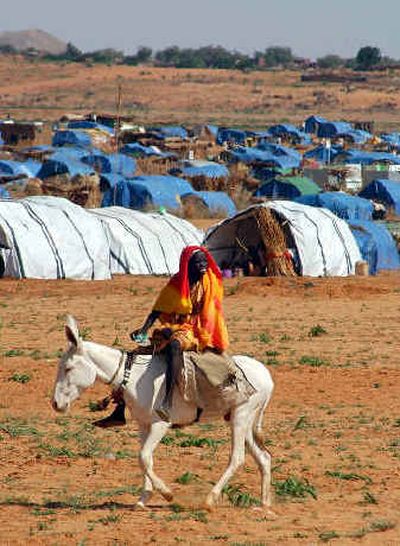Gigantic relief trek under way in Sudan

AL-FASHER, Sudan – Trucks loaded with food and other relief supplies began a two-week trek to Sudan’s vast Darfur region Friday, opening a mammoth Red Cross effort to help hundreds of thousands of people made homeless by ethnic fighting.
U.N. officials consider the plight of the arid region’s 1.4 million displaced people as the world’s worst humanitarian crisis, and the international Red Cross is mounting its biggest relief operation anywhere, spokeswoman Julia Bassam said in Khartoum, the Sudanese capital.
She said the eight-truck convoy would leave Red Cross warehouses in Khartoum every two days. A giant cargo plane is making six trips from Switzerland, ferrying nearly 800 tons of trucks and other equipment needed for the relief operation.
Food and medicine are desperately needed in 147 refugee camps scattered across a region the size of France. An estimated 43,000 people are sheltering at Abu Shouk, a camp near the North Darfur capital, Al-Fasher, where the Rev. Jesse Jackson visited Friday.
Crouching over an elderly woman too frail and weak to move, the American civil rights campaigner said the world isn’t doing enough for Darfur. “For too long this crisis has been ignored,” Jackson said.
Relief efforts are expanding with the approach of the Monday deadline set by the U.N. Security Council for Sudan’s government to disarm militias from Arabic tribes of nomadic herders accused of killing more than 30,000 African farmers and looting and burning their villages. The violence erupted when two African movements rebelled against the Khartoum regime, accusing it of siding with the Arab tribes in disputes over scarce water and arable land.
Sudan’s Arab-dominated government has pledged to work with the international community to restore calm in Darfur while denying charges from aid groups and others that it has supported the Arab militias, known as the Janjaweed.
But attacks are still being reported, and Human Rights Watch, a U.S.-based advocacy group, issued a statement Friday accusing the Sudanese government of letting the militias maintain at least 16 bases in the region – including five apparently shared with the military.
“Throughout the time Khartoum was supposedly reining in the Janjaweed, these camps have been operating in plain sight,” said Peter Takirambudde, executive director of the group’s Africa division.
Jean-Marie Fakhouri, head of Sudan operations for the U.N. High Commissioner for Refugees, said Darfur’s people are “barely managing” and warned of the danger that unrest poses for the relief effort. “The situation has improved in terms of assistance to the camps, but it is extremely fragile,” he said.
Bassam said the Red Cross had seen improved cooperation from Sudan’s leaders, and U.N. officials have made similar reports. Previously, aid groups complained that the government prevented them from getting aid to Darfur.
Still, Bassam said, if hurdles had been cleared earlier, the aid convoys might have been able to set out before the rainy season. Rains that began in July have filled valleys with water and turned desert tracks into muddy traps, particularly in West Darfur, one of the most inaccessible areas in the region.